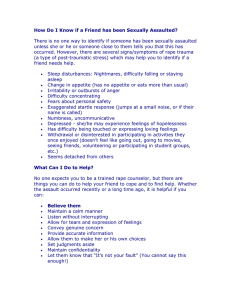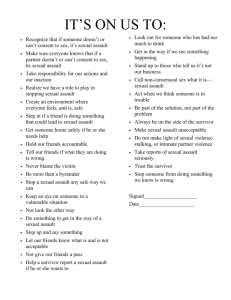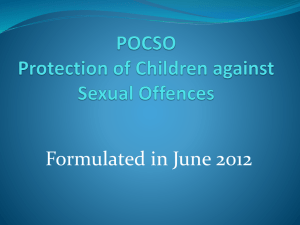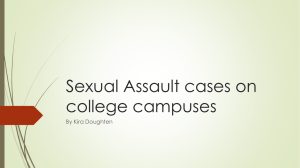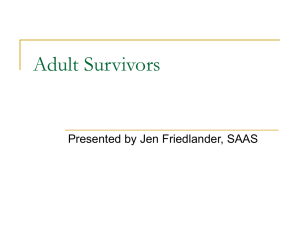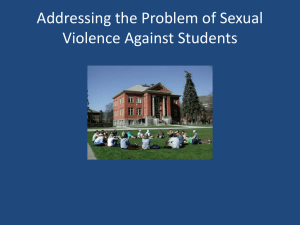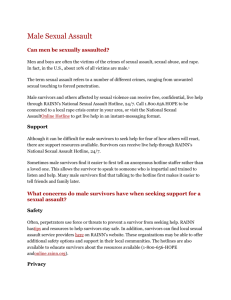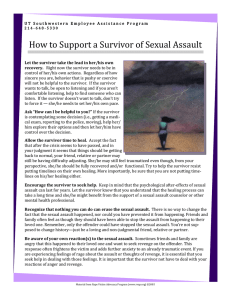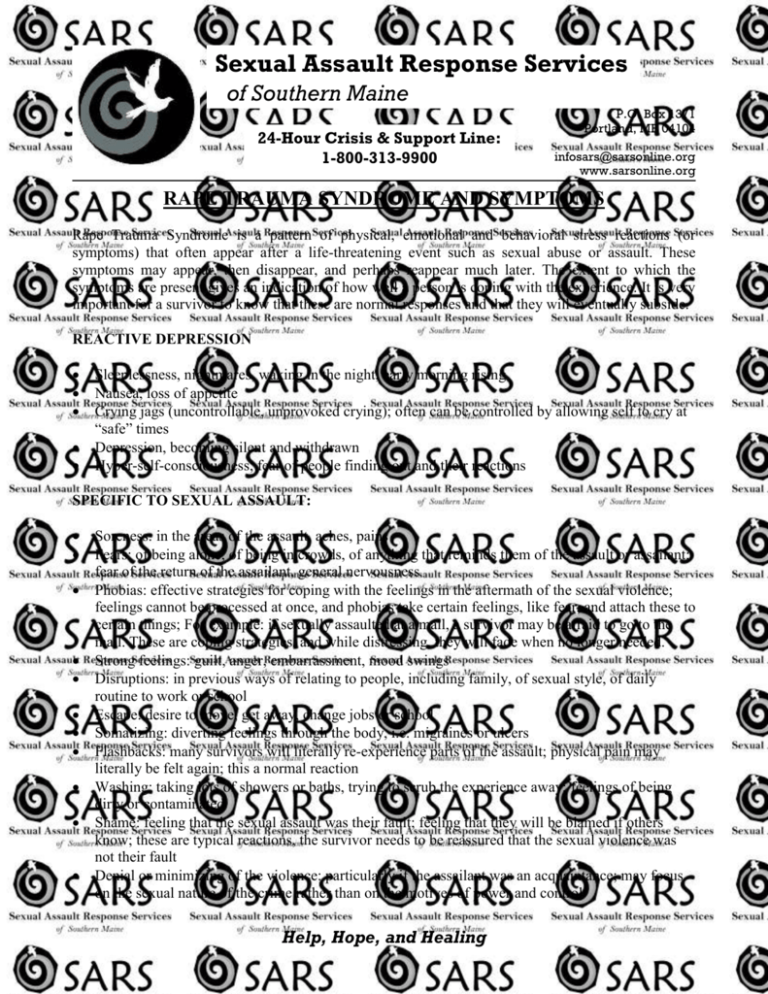
Sexual Assault Response Services
of Southern Maine
24-Hour Crisis & Support Line:
1-800-313-9900
P.O. Box 1371
Portland, ME 04104
infosars@sarsonline.org
www.sarsonline.org
RAPE TRAUMA SYNDROME AND SYMPTOMS
Rape Trauma Syndrome is a pattern of physical, emotional and behavioral stress reactions (or
symptoms) that often appear after a life-threatening event such as sexual abuse or assault. These
symptoms may appear, then disappear, and perhaps reappear much later. The extent to which the
symptoms are present gives an indication of how well a person is coping with the experience. It is very
important for a survivor to know that these are normal responses and that they will eventually subside.
REACTIVE DEPRESSION
Sleeplessness, nightmares, waking in the night, early morning rising
Nausea, loss of appetite
Crying jags (uncontrollable, unprovoked crying); often can be controlled by allowing self to cry at
“safe” times
Depression, becoming silent and withdrawn
Hyper-self-consciousness, fear of people finding out and their reactions
SPECIFIC TO SEXUAL ASSAULT:
Soreness: in the areas of the assault, aches, pains
Fears: of being alone, of being in crowds, of anything that reminds them of the assault or assailant;
fear of the return of the assailant, general nervousness
Phobias: effective strategies for coping with the feelings in the aftermath of the sexual violence;
feelings cannot be processed at once, and phobias take certain feelings, like fear, and attach these to
certain things; For example: if sexually assaulted at a mall, a survivor may be afraid to go to the
mall. These are coping strategies, and while distressing, they will fade when no longer needed.
Strong feelings: guilt, anger, embarrassment, mood swings
Disruptions: in previous ways of relating to people, including family, of sexual style, of daily
routine to work or school
Escape: desire to move, get away, change jobs or school
Somatizing: diverting feelings through the body, i.e. migraines or ulcers
Flashbacks: many survivors will literally re-experience parts of the assault; physical pain may
literally be felt again; this a normal reaction
Washing: taking lots of showers or baths, trying to scrub the experience away; feelings of being
dirty or contaminated
Shame: feeling that the sexual assault was their fault; feeling that they will be blamed if others
know; these are typical reactions, the survivor needs to be reassured that the sexual violence was
not their fault
Denial or minimizing of the violence: particularly if the assailant was an acquaintance; may focus
on the sexual nature of the crime rather than on the motives of power and control
Help, Hope, and Healing
All symptoms will run their course. Although the reactions of depression, anger, fear, guilt, shame
and sadness are normal these feelings are painful and will be the strongest for the first six to eight
weeks, with marked improvements at six months to one year. Eighteen months and three years are
also markers. The primary symptoms are typically over in 12 to 18 months, but this varies greatly
for each individual.
Post-Rape Phases: There are three defined and overlapping phases that occur for most survivors.
1. Phase One (Acute Phase): survivor is in extreme stress or shock. May express great fear and
anxiety and display some of the symptoms of Rape Trauma Syndrome listed above. Some
people may become very quiet and controlled in their response. Others may be all smiles and
giggly. Still others may cry and become hysterical. There is no single reaction; it depends on
the person’s usual way of responding to stress. This phase may last hours or days.
2. Phase Two: survivor appears to accept the fact of the sexual violence, and an attitude of “I’ve
got to live with it” begins to emerge. Wants to get on with the business of living and forgetting
what happened. Still may be experiencing a lot of the above symptoms. This phase may last
weeks, months, or even years.
3. Phase Three: survivor begins to think increasingly about what happened. Some of the
symptoms may return and the survivor may become depressed, anxious, or fearful. Functions
less well generally. Feels a need to talk about the sexual assault and resulting feelings.
ANNIVERSARY REACTIONS:
The first year anniversary reaction may onset up to ten days before, symptoms may reoccur, the day or
the date is the most unsettled, but 48 to 72 hours later the survivor will usually begin to feel better.
Each year the reaction will usually continue to diminish and eventually stop.
Most survivors do not develop major sexual dysfunction after the sexual violence if they were healthy
and sexually active before. Those not active before may have more problems because they have no
“normal” history. Others can discard the experience as sexually aberrant.
RECOVERY FROM SEXUAL ASSAULT IS POSSIBLE:
It is important that survivors of sexual assault know that what they are going through is normal and
that recovery from sexual assault is possible. Each survivor will be affected differently by the crisis
and will find their own path to recovery. Recovery will be at different rates and in different manners
depending upon their specific personality, the support network available to them, and the reactions of
those with whom they first have contact with after the assault. It is important for survivors to make
their own decisions to help them to regain control over their bodies and their lives.


